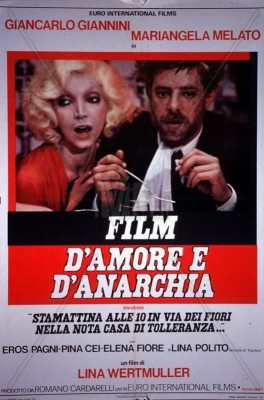| Reviews & Columns |
|
Reviews DVD TV on DVD Blu-ray 4K UHD International DVDs In Theaters Reviews by Studio Video Games Features Collector Series DVDs Easter Egg Database Interviews DVD Talk Radio Feature Articles Columns Anime Talk DVD Savant Horror DVDs The M.O.D. Squad Art House HD Talk Silent DVD
|
DVD Talk Forum |
|
|
| Resources |
|
DVD Price Search Customer Service #'s RCE Info Links |
|
Columns
|
|
|
Love and Anarchy
Happily, the video transfer on Love and Anarchy is a marked improvement over The Seduction of Mimi and is virtually flawless. Supplements include a meager stills gallery and three trailers.
In pre-war Fascist Italy, a peasant farmer (Giannini) watches helplessly as police murder his anarchist friend, who'd plotted to assassinate dictator Benito Mussolini. Quietly outraged, he decides to assume his friend's place. After winning approval and training from co-conspirators in Paris (not shown), Tunin turns up in Rome, at a ritzy, exclusive brothel ("Seven lire a fuck," someone says; its madam insists on calling it a maison) and where another conspirator, Salomè (Melato), has been working as a prostitute since her anarchist lover was beaten to death by police.
Masquerading as Salomè's unworldly cousin, naïve and wide-eyed country boy Tunin all but lives at the brothel for the days leading up to the planned assassination. Gathering vital information, Salomè has been encouraging the slovenly advances of a Spatoletti (Eros Pagni), a devout if grotesque follower of Il Duce and head of Mussolini's security police. She arranges an outing for them, a foursome including Tunin and his "date," Tripolina (Lina Polito), another prostitute, so that Salomè and Tunin can learn Spatoletti's upcoming security arrangements.
However, both Salomè and Tripolina fall in love with the doomed Tunin, and their opposing reactions to their personal feelings threaten to unravel everything.
Part of what makes Love and Anarchy so interesting is that Tunin is the antithesis of the stereotypically militant anarchist. Giannini's Tunin is like an Italian peasant farmer version of Billy Bibbit: unblinking and glassy-eyed, cheap suit, reserved, painfully shy and sexually inexperienced, unfailingly polite - in short, a gentle anarchist. Clever makeup and hairstyling submerges Giannini's good looks beneath a blizzard of freckles and shock of sandy red hair.
And because he treats Salomè, Tripolina, and all the other prostitutes with a respect their wealthy (and presumably mostly fascist) customers do not, Salomè and Tripolina begin to question their roles in society in ways until now they'd taken for granted. "Why all this respect for me?!" Tripolini demands to know. Salomè, because of her lover's death, is passionately antifascist and dedicated to the cause. For that cause she plays the part of the worldly hooker, one who in turn patterns herself after Jean Harlow, complete with platinum-blonde hair.
Tunin, in assuming the identity of his anarchist friend, comes to define himself as an anarchist with but one purpose, to assassinate Mussolini, and therefore resigns himself to an imminent and violent death. The climax to the film, which I won't reveal here, reinforces this; how else to explain Tunin's otherwise unfathomable actions? By then he can't imagine himself as anything else.
Giannini dazzles. He adopts this strange, guttural voice that Italians might identify as a specifically regional or rural accent. Regardless, even to non-Italian-speaking audiences it sounds exactly right. In sharp contrast to Mimí, his face is practically frozen throughout, but the intensity of his emotions - crippling fear, love and passion - are beautifully expressed through sad, puppy dog green eyes.
The film is more lavish than Mimi and gets period details right in ways few films do, especially at the brothel, where the makeup, costumes, and the women themselves are so authentic.
Video & Audio
Presented in 1.78:1 format, approximately its original 1.85:1 theatrical aspect ratio, Love and Anarchy looks great, an obvious improvement over The Seduction of Mimi. Colors are both richer and truer, while detail is excellent and minus the digital noise distracting at times on Mimi. The 1920 x 1080p transfer is accompanied by a strong Italian mono track, supported by good English subtitles. My single complaint is that a song, heard several times in the film (and even on the main menu screen itself), goes unsubtitled, possibly for legal reasons. (Lawyers can be quite persnickety about published lyrics, even in cases like this.) Although the film was cut to 108 minutes when first released in America, this is the complete, 128-minute version.
Extra Features
As with Mimi, supplements are light, in this case a stills gallery (with pleasingly sharp images this time) and three different Italian trailers for the film, which at least are all in high-def.
Parting Thoughts
A great film and a fine transfer. This one's not to be missed. A DVD Talk Collector Series Title.
Stuart Galbraith IV is a Kyoto-based film historian whose work includes film history books, DVD and Blu-ray audio commentaries and special features. Visit Stuart's Cine Blogarama here.
|
| Popular Reviews |
| Sponsored Links |
|
|
| Sponsored Links |
|
|
| Release List | Reviews | Shop | Newsletter | Forum | DVD Giveaways | Blu-Ray | Advertise |
|
Copyright 2024 DVDTalk.com All Rights Reserved. Legal Info, Privacy Policy, Terms of Use,
Manage Preferences,
Your Privacy Choices | |||||||















